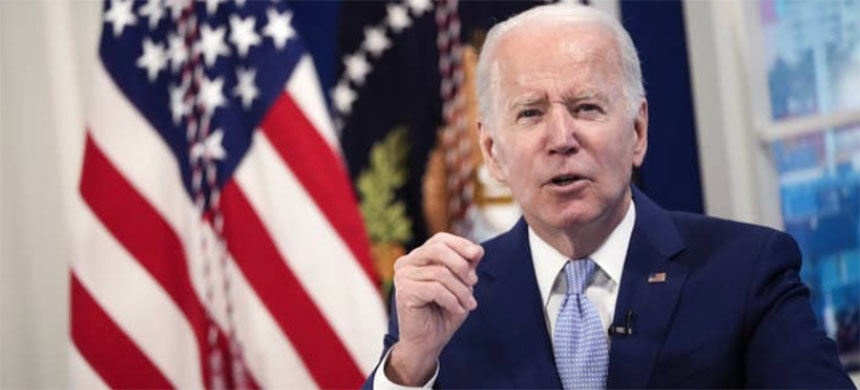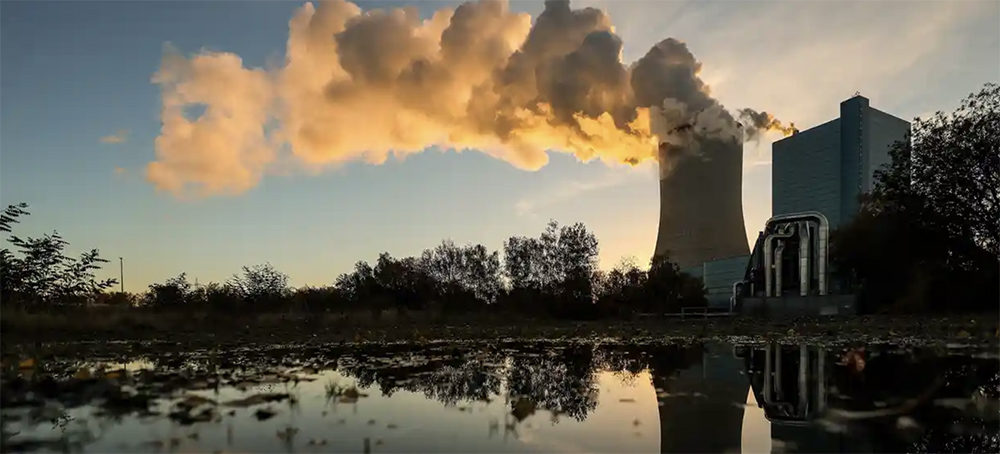Live on the homepage now!
Reader Supported News
This finding underlines the way global heating is speeding up, as we put more and more heat-trapping carbon dioxide into the atmosphere. Global temperatures fluctuate with phenomena like the El Niño/ El Niña, caused by warming or cooling surface temperatures in the eastern equatorial Pacific Ocean. So to get the kind of consistent high temperatures of the past seven years demonstrates that a more powerful “forcing” is overriding El Niño/ El Niña. That is green house gas emissions.
We typically measure increases of temperature over the late nineteenth-century baseline, sort of 1880-1900. We are now about 2 degrees Fahrenheit (1.1- 1.2 degree Centigrade) above that marker. Climate scientists worry that if we go higher than 1.5C / 2.7F, the earth’s climate could go chaotic. Moreover, if we go on as we are, we will outrun our safety valve. All the extra CO2 we have spewed into the atmosphere so far will be absorbed by the oceans, so the earth will gradually cool back down.
But the oceans have a limit to what they can absorb, and we will go past that limit at our current rates by 2050. Any carbon dioxide we put up after that will be around for thousands, maybe 100,000 years. We are on the verge of radically changing the earth’s climate in a way that could last for as long as the human race has existed.
The long-lasting character of CO2 in the atmosphere is why I think it is the main threat. Methane is also a greenhouse gas, but it dissipates relatively quickly.
More bad news. Carbon dioxide emissions continued to rise in 2021, reaching an average of 414 parts per million. That is a truly scary statistic. Oliver Milman at The Guardian reports that greenhouse gas emissions were up 6.2% in 2021 over 2022, most of the increase coming from gasoline-driven cars and trucks.
I have written, “The last time it was 410 ppm was the middle Pliocene, stretching from 3.15 and 2.85 million years ago. Temperatures in the middle Pliocene were on average 2-3 degrees C. (3.6 – 5.8 degrees F.) higher than today. The Arctic was 10 degrees C. hotter than today’s. Seas were roughly 90 feet higher. Some places now wet were desert-like.” I wrote that in 2019 when the CO2 ppm was only 410.
Copernicus notes that we are already seeing Frankenstein’s Weather as a result of this massive concentration of heat trapping gases. There were severe floods in Germany and elsewhere in Europe last summer, wildfires in Greece and Turkey, and a heat wave in the southern Mediterranean beyond anything in the historical record. It reached just about 120 degrees F/ 48.8C in Sicily, the highest temperature ever recorded in Europe.
In North America we saw global heating burn up whole towns in Canada and create record temperatures in usually temperate Seattle and Portland. The Dixie wildfire in California was the second worst on record.
Climate change is not a matter of a dystopian future. We are living it. Now. And it is an increasing challenge. It is a challenge we can overcome, but the longer we burn fossil fuels the steeper the task will be.
 Joe Biden. (photo: Drew Angerer/Getty Images)
Joe Biden. (photo: Drew Angerer/Getty Images)
The remarks from Biden, who was a senator for 36 years, amounted to his strongest endorsement yet of changes he had resisted for most of his career. The president made clear that he, like many others in his party, now believes the filibuster is being abused to block legislation that is fundamental to democracy.
“The United States Senate, designed to be the world’s greatest deliberative body, has been rendered a shell of its former self,” Biden told hundreds of college students, civil rights activists and elected officials at the Atlanta University Center. “I believe that the threat to our democracy is so grave that we must find a way to pass these voting rights bills.”
If the Senate does not at least agree to debate the voting bills, “we have no option but to change the Senate rules, including getting rid of the filibuster for this,” Biden said, to applause.
Much of the speech was a blistering attack on Republicans of the kind Biden has long avoided, taking aim at those opposing voting rights measures in Congress as well as those enacting voting restrictions in the states.
“The facts won’t matter. Your votes won’t matter,” Biden said. “They will just decide what they want and then do it. That’s the kind of power you see in totalitarian states, not in democracies.”
The tough language extended Biden’s shift toward a more combative tone in recent weeks, after nearly a year of carefully courting Republicans and Democratic centrists. Last month the White House issued a sharp condemnation of Sen. Joe Manchin III (D-W.Va.), and Biden on Thursday condemned former president Donald Trump in newly forceful terms.
Under the Senate’s filibuster rules, most bills need 60 votes to pass, a threshold that is increasingly difficult to meet in the polarized chamber. The Senate is split 50-50 between the parties, and Republicans are almost entirely unified against the voting rights bills.
Many civil rights activists are frustrated that Biden has not pushed harder to protect the vote, and some stayed away from the president’s visit. The Rev. Al Sharpton met with Biden after his address, saying, “I told the president he gave a monumental speech and, though I have been challenging him for months to be forthcoming, it was better late than never.”
Vice President Harris, herself a former senator, also embraced amending the filibuster as she spoke before Biden at the Atlanta University Center, sandwiched between two historically Black institutions in a state that is steeped in civil rights history.
“Nowhere does the Constitution give a minority the right to unilaterally block legislation,” Harris said. “The American people have waited long enough.”
The Democratic efforts are focused on two bills: the John Lewis Voting Rights Advancement Act, which would restore the federal government’s authority to review certain state voting laws to prevent discrimination, and the Freedom to Vote Act, a broader bill that would create national rules for voting by mail, early voting and other parts of the electoral process.
Senate Majority Leader Charles E. Schumer (D-N.Y.) plans to bring a package of rules changes to the floor before Martin Luther King Jr. Day next week. On Tuesday, Schumer warned that the threats of voter suppression are not false — as Senate Republicans have claimed — but dangerous, and he indicated that Senate action could come as early as Wednesday.
“Failure is not an option for the democracy of America,” Schumer told reporters.
Any shift would require the agreement of all 50 Democratic caucus members. But at least two centrists — Manchin and Sen. Kyrsten Sinema of Arizona — have resisted the changes, making the prospects for action uncertain at best.
While Manchin has spent weeks in negotiations with fellow Democratic senators over possible rules changes, he told reporters Tuesday that he was not interested in changing the Senate’s rules on a party-line vote.
“We need some good rules changes, and we can do that together,” he said. “But you change the rules with two-thirds of the people that are present so it’s Democrats, Republicans changing the rules to make the place work better. Getting rid of the filibuster does not make it work better.”
In Atlanta, the president did not point a finger at specific senators by name, but he said the Senate vote would mark a turning point in American history.
“Will we choose democracy over autocracy? Light over shadows? Justice over injustice? I know where I stand,” Biden said. “The question is, where will the institution of the United States Senate stand?”
Biden’s speech is the latest move in an increasingly bitter partisan fight over voting. Democrats are angry at an array of voting restrictions imposed by GOP-led states, including Georgia, where Biden visited King’s crypt on Tuesday before making his speech.
Republicans have made clear they will not take part in any effort to rewrite the Senate rules to pass the voting bills. At a Capitol Hill news conference Tuesday, more than a dozen Senate Republicans blasted efforts to change the filibuster. Several quoted Schumer’s own past remarks on the topic, including a 2005 comment that eliminating the rule would spell “doomsday for democracy.”
“Here we are today, with them eating their words,” said Sen. Shelley Moore Capito (R-W.Va.). “That’s hypocritical at the face of it.”
Several senators in the Democratic caucus who signed a 2017 letter arguing for the preservation of the 60-vote threshold for legislation said circumstances have changed amid Republican efforts to undermine voting rights across the country.
One of them, Sen. Angus King (I-Maine), said he believed the upcoming vote would be the most important one he takes in his life.
“It’s ironic in the extreme to enshrine the principle of bipartisanship here in the Senate to the extent that we can’t repair damage done to the democracy by 100 percent partisan legislatures” around the country, King said.
Reflecting the lack of a clear path forward, Democrats have not arrived at a unified proposal for amending the filibuster.
Discussions have centered on two main alternatives: creating a carve-out that would simply exempt voting rights legislation from the 60-vote threshold, or returning to the “talking filibuster,” which would require senators to physically speak on the floor to block a vote on legislation.
Historically, that requirement has led to marathon speeches, as dramatized in movies such as “Mr. Smith Goes to Washington.” But currently, senators only have to state their intention to block a bill, making the tactic far easier.
Biden on Tuesday called on Congress to pass both the Freedom to Vote Act and the John Lewis Voting Rights Advancement Act immediately. He has made phone calls and met virtually with a handful of Democratic senators in recent weeks, and he signaled that his patience is waning.
“I’ve been having these quiet conversations with members of Congress for the last two months. I’m tired of being quiet,” Biden said, striking the lectern with his palm.
Several Democrats joined Biden on Tuesday, including Georgia’s two senators, Democrats Raphael G. Warnock and Jon Ossoff.
But notably absent was Stacey Abrams, who has been at the forefront of registering voters in Georgia and is running for governor. Seth Bringman, a spokesman for Abrams, said she “has a conflict, expressed her support and will continue to.”
Before leaving Washington earlier Tuesday, Biden dismissed the notion of any friction between him and Abrams, telling reporters he was insulted by the question. White House press secretary Jen Psaki said Biden and Abrams held a “warm” phone call earlier Tuesday. Abrams, in a statement late Tuesday, thanked the president and vice president “for returning to Georgia to continue their steadfast advocacy for passage of federal legislation to protect the freedom to vote.”
Still, a number of civil rights groups announced boycotts of Biden and Harris’s visit, expressing impatience with the lack of action from Washington. Psaki declined to comment on the protests, noting that Biden was flying with a “full plane of congressional leaders and advocates for voting rights” and meeting with an array of civil rights leaders in Georgia.
Republicans, many embracing the discredited notion that Trump won the 2020 presidential election, dismiss Democrats’ complaints about the new state-level voting restrictions and argue that the changes are needed to prevent fraud and restore faith in the vote.
Georgia’s law, for example, expands voter ID requirements, imposes new rules on early voting, and forbids handing out food or water to people waiting in line to vote, among other measures.
Republican National Committee Chairwoman Ronna McDaniel said it was Democrats who were abusing the process by seeking to overrule state voting laws. “No number of lies told or fake hysteria pushed today justify Democrats’ agenda to break the Senate and destroy American elections,” McDaniel said.
Senate Minority Leader Mitch McConnell (R-Ky.) on Tuesday renewed a threat to grind the Senate to a halt using time-consuming procedural maneuvers if Democrats unilaterally change the rules.
“If the Democratic leader tries to shut millions of Americans and entire states out of the business of governing, the operations of this body will change,” he said. “. . . But not in ways that reward the rule-breakers, not in ways that advantage this president, this majority, or their party. I guarantee it.”
Five times since the Voting Rights Act was first passed in 1965, Republicans have voted to reauthorize it, but GOP support for key enforcement provisions has all but evaporated since the Supreme Court gutted them in recent decisions. Only Sen. Lisa Murkowski (R-Alaska) voted with Democrats last year to advance the John Lewis bill, which would restore federal oversight of election laws in jurisdictions with a history of racial discrimination.
The Freedom to Vote Act, meanwhile, has garnered no Republican support. It not only sets a single nationwide minimum standard for early voting and vote-by-mail in a bid to reverse some of the new state-level GOP laws, but it also aims to overhaul a wide range of election and campaign-finance practices.
 US Army Pershing II ballistic missiles, later banned by the 1987 INF Treaty. (image: Breaking Defense)
US Army Pershing II ballistic missiles, later banned by the 1987 INF Treaty. (image: Breaking Defense)
The statement, titled “A Call to Eliminate ICBMs,” warns that “intercontinental ballistic missiles are uniquely dangerous, greatly increasing the chances that a false alarm or miscalculation will result in nuclear war.”
Citing the conclusion reached by former Defense Secretary William Perry that ICBMs “could even trigger an accidental nuclear war,” the organizations urged the U.S. government to “shut down the 400 ICBMs now in underground silos that are scattered across five states -- Colorado, Montana, Nebraska, North Dakota and Wyoming.”
“Rather than being any kind of deterrent, ICBMs are the opposite -- a foreseeable catalyst for nuclear attack,” the statement says. “ICBMs certainly waste billions of dollars, but what makes them unique is the threat that they pose to all of humanity.”
Norman Solomon, national director of RootsAction.org, said the statement could represent a turning point in the range of options being debated about ICBMs. “Until now, the public discussion has been almost entirely limited to the narrow question of whether to build a new ICBM system or stick with the existing Minuteman III missiles for decades longer,” he said. “That’s like arguing over whether to refurbish the deck chairs on the nuclear Titanic. Both options retain the same unique dangers of nuclear war that ICBMs involve. It’s time to really widen the ICBM debate, and this joint statement from U.S. organizations is a vital step in that direction.”
RootsAction and Just Foreign Policy led the organizing process that resulted in the statement being released today.
Here is the full statement, followed by a list of the signing organizations:
Joint statement by U.S. organizations being released on January 12, 2022
A Call to Eliminate ICBMs
Intercontinental ballistic missiles are uniquely dangerous, greatly increasing the chances that a false alarm or miscalculation will result in nuclear war. There is no more important step the United States could take to reduce the chances of a global nuclear holocaust than to eliminate its ICBMs.
As former Defense Secretary William Perry has explained, “If our sensors indicate that enemy missiles are en route to the United States, the president would have to consider launching ICBMs before the enemy missiles could destroy them; once they are launched, they cannot be recalled. The president would have less than 30 minutes to make that terrible decision.” And Secretary Perry wrote: “First and foremost, the United States can safely phase out its land-based intercontinental ballistic missile (ICBM) force, a key facet of Cold War nuclear policy. Retiring the ICBMs would save considerable costs, but it isn’t only budgets that would benefit. These missiles are some of the most dangerous weapons in the world. They could even trigger an accidental nuclear war.”
Rather than being any kind of deterrent, ICBMs are the opposite -- a foreseeable catalyst for nuclear attack. ICBMs certainly waste billions of dollars, but what makes them unique is the threat that they pose to all of humanity.
The people of the United States support huge expenditures when they believe the spending protects them and their loved ones. But ICBMs actually make us less safe. By discarding all of its ICBMs and thereby eliminating the basis for U.S. “launch on warning,” the U.S. would make the whole world safer -- whether or not Russia and China chose to follow suit.
Everything is at stake. Nuclear weapons could destroy civilization and inflict catastrophic damage on the world’s ecosystems with “nuclear winter,” inducing mass starvation while virtually ending agriculture. That is the overarching context for the need to shut down the 400 ICBMs now in underground silos that are scattered across five states -- Colorado, Montana, Nebraska, North Dakota and Wyoming.
Closure of those ICBM facilities should be accompanied by major public investment to subsidize transition costs and provide well-paying jobs that are productive for the long-term economic prosperity of affected communities.
Even without ICBMs, the formidable U.S. nuclear threat would remain. The United States would have nuclear forces capable of deterring a nuclear attack by any conceivable adversary: forces deployed either on aircraft, which are recallable, or on submarines that remain virtually invulnerable, and thus not subject to the “use them or lose them” dilemma that the ground-based ICBMs inherently present in a crisis.
The United States should pursue every diplomatic avenue to comply with its obligation to negotiate nuclear disarmament. At the same time, whatever the status of negotiations, the elimination of the U.S. government’s ICBMs would be a breakthrough for sanity and a step away from a nuclear precipice that would destroy all that we know and love.
“I refuse to accept the cynical notion that nation after nation must spiral down a militaristic stairway into the hell of thermonuclear destruction,” Martin Luther King Jr. said as he accepted the Nobel Peace Prize in 1964. Nearly 60 years later, the United States must eliminate its ICBMs to reverse that downward spiral.
Action Corps
Alaska Peace Center
American Committee for U.S.-Russia Accord
Arab American Action Network
Arizona Chapter, Physicians for Social Responsibility
Back from the Brink Coalition
Backbone Campaign
Baltimore Phil Berrigan Memorial Chapter, Veterans For Peace
Beyond Nuclear
Beyond the Bomb
Black Alliance for Peace
Blue America
Campaign for Peace, Disarmament and Common Security
Center for Citizen Initiatives
Chesapeake Physicians for Social Responsibility
Chicago Area Peace Action
Code Pink
Demand Progress
Environmentalists Against War
Fellowship of Reconciliation
Global Network Against Weapons … Nuclear Power in Space
Global Zero
Greater Boston Physicians for Social Responsibility
Historians for Peace and Democracy
Jewish Voice for Peace Action
Just Foreign Policy
Justice Democrats
Lawyers Committee on Nuclear Policy
Linus Pauling Chapter, Veterans For Peace
Los Alamos Study Group
Maine Physicians for Social Responsibility
Massachusetts Peace Action
Muslim Delegates and Allies
No More Bombs
Nuclear Age Peace Foundation
Nuclear Watch New Mexico
Nukewatch
Oregon Physicians for Social Responsibility
Other98
Our Revolution
Pax Christi USA
Peace Action
People for Bernie Sanders
Physicians for Social Responsibility
Prevent Nuclear War Maryland
Progressive Democrats of America
Reader Supported News
San Francisco Bay Physicians for Social Responsibility
Santa Fe Chapter, Veterans For Peace
Spokane Chapter, Veterans For Peace
U.S. Palestinian Community Network
United for Peace and Justice
Veterans For Peace
Washington Physicians for Social Responsibility
Western North Carolina Physicians for Social Responsibility
Western States Legal Foundation
Whatcom Peace and Justice Center
Win Without War
Women Transforming Our Nuclear Legacy
World Beyond War
Yemen Relief and Reconstruction Foundation
Youth Against Nuclear Weapons
 California has tried and failed to replace private health insurance with a universal, state-funded program before. (photo: Yves Herman/Reuters)
California has tried and failed to replace private health insurance with a universal, state-funded program before. (photo: Yves Herman/Reuters)
The bills to create and fund universal healthcare face opposition from powerful lobbies for doctors and insurance companies
Lawmakers are debating two bills – one would create the universal healthcare system, another would outline plans to fund it by increasing taxes, especially for wealthy individuals and businesses. The sweeping healthcare reform faces significant hurdles, including opposition from powerful lobbies for doctors and insurance companies. If the bills are approved by the legislature, voters would ultimately have to approve the taxes to fund the new system in an amendment to the California constitution.
California has tried and failed to replace private health insurance with a universal, state-funded program for years. Voters rejected such a proposal in 1994 and state lawmakers failed to find a way to fund a single-payer health system in 2017.
Attempts to create universal healthcare nationally have failed to gain traction despite being promoted by prominent progressive lawmakers, including 2020 presidential candidate Senator Bernie Sanders. State legislatures in Vermont and New York have also tried and failed to create universal healthcare plans.
“There are countless studies that tell us a single-payer healthcare system is the fiscally sound thing to do, the smarter healthcare policy to follow, and a moral imperative if we care about human life,” said the California assemblyman Ash Kalra, who authored the proposal.
California’s governor Gavin Newsom, a Democrat, campaigned for office in 2018 with the promise of helping usher in a single-payer health system but is facing re-election this year without making clear whether universal healthcare is still a priority.
“I think that the ideal system is a single-payer system. I’ve been consistent with that for well over a decade,” he said on Monday at a news conference. But he said he had not “had the opportunity to review” the plan being debated by legislature.
In the meantime, Newsom on Monday unveiled his own proposal to expand access to Medi-Cal, a state-run healthcare program for low-income Californians, to extend eligibility to all residents regardless of immigration status. Newsom’s plan proposes spending $2.2bn a year to expand Medi-Cal eligibility for all low-income residents, after years of incrementally including first undocumented children and then seniors in the program.
The proposal, if approved by California’s legislature, would expand health coverage for about 700,000 additional people. If it gets final approval this summer, it could take effect by 2024.
Although inequities in healthcare access exacerbated by the Covid-19 pandemic have intensified calls for healthcare reform, efforts to institute a universal health system, or even a public healthcare option, have historically faced implacable opposition from powerful private healthcare lobbies.
The Affordable Care Act (ACA), which expanded healthcare in the US, created insurance market exchanges where people without employer-sponsored insurance could shop for coverage and subsidies to help Americans afford insurance. The legislation dramatically expanded healthcare access, but stopped short of creating a public, government-run healthcare option. Despite reforms enacted by the ACA, medical bills remain the leading cause of debt for Americans.
Were California to adopt a universal healthcare system, the state would funnel state and federal dollars allocated for healthcare into a single, government-run program. The insurance industry and business groups are rallying against the proposal, which would be paid for with higher taxes mostly on the wealthiest individuals and businesses, but would increase taxes for all but the lowest-earning Californians.
Supporters of the plan say that despite the taxes, employers and individuals would pay less for health coverage overall. A state-run system would also include more benefits, more cheaply, by eliminating the need to account for insurance company profits.
The California Nurses association over the weekend held demonstrations in favor of the universal healthcare proposal. “As nurses, we’ve seen patients get care delayed or denied because they could not afford it,” said Cathy Kennedy, president of the California Nurses Association. “This for-profit healthcare system has cost lives, all so that a few health insurance executives can line their pockets.”
 A migrant boy, who returned to Mexico with his parents from the U.S. under the Migrant Protection Protocols (MPP) to wait for their court hearing for asylum seekers, plays at a migrant shelter run by the federal government in Ciudad Juarez, Mexico September 26, 2019. (photo: Jose Luis Gonzalez/Reuters)
A migrant boy, who returned to Mexico with his parents from the U.S. under the Migrant Protection Protocols (MPP) to wait for their court hearing for asylum seekers, plays at a migrant shelter run by the federal government in Ciudad Juarez, Mexico September 26, 2019. (photo: Jose Luis Gonzalez/Reuters)
They want President Joe Biden, a fellow Democrat, to take executive action to grant Temporary Protected Status (TPS) to Central American immigrants from Guatemala and expand eligibility for those from El Salvador, Honduras and Nicaragua.
Senator Robert Menendez and more than 30 fellow Democrats wrote to top administration officials calling on them to act after a failed push last year to pass immigration reform during Biden's first year in office.
Arrests at the U.S.-Mexico border reached record highs last year, fueled by new arrivals from Central America.
TPS allows people already in the United States at the time of the designation to stay and work legally if their home countries have been affected by natural disasters, armed conflicts or other events that prevent their safe return.
The designations, which are issued by the secretary of homeland security, last six to 18 months and can be renewed indefinitely.
"It is our assessment that the severe damage caused by back-to-back hurricanes just over one year ago, combined with extreme drought conditions, and the social and economic crises exacerbated by the COVID-19 pandemic, warrant such an action by the administration," the lawmakers wrote in the letter seen by Reuters.
More than 300,000 immigrants from El Salvador, Honduras and Nicaragua already have TPS.
Under the proposal, at least another 2 million immigrants from the region could be eligible for deportation relief, according to an estimate generated early last year by the Migration Policy Institute, a Washington-based think tank.
The estimate did not account for the high volume of border crossings in 2021 and the Menendez-led letter did not say how many people could be eligible.
Critics contend the temporary protections encourage more illegal entries.
 Journalist Pablo Hernandez, Honduras. (photo: Twitter/@Orlinmahn)
Journalist Pablo Hernandez, Honduras. (photo: Twitter/@Orlinmahn)
For years now, Honduras has become one of the most dangerous places for human rights defenders, environmental activists, journalists, and social leaders.
Bertha Oliva, the coordinator of the Committee of Relatives of the Disappeared in Honduras (COFADEH), denounced that armed men ambushed Hernandez on a dirt road.
"This murder is one more attack on freedom of expression and the defense of human rights," The Association of Community Media in Honduras (AMCH) said, recalling that Hernandez was director of the Tenan community radio station that broadcasts from San Marcos de Caiquin.
“Hernandez was the second Lenca leader killed in less than a year. In March 2020, Lenca activist Juan Carlos Cerros was shot to death in the town of Nueva Granada," news agency AP recalled, adding that they "belonged to the same indigenous community as Berta Caceres, a prize-winning environmental and Indigenous rights defender who was murdered in 2016."
The AMCH denounced that Hernandez was threatened and harassed on several occasions for defending the rights of Indigenous peoples, for which he filed a complaint with the authorities.
Besides having been a promoter of the Indigenous University, Hernandez was mayor of the Auxiliaria de La Vara Alta, coordinator of ecclesial base communities, and president of the Cacique Lempira Biosphere Agro-Ecologists Network.
The assassination of the Indigenous journalist was also condemned by former President Manuel Zelaya, whose wife, Xiomara Castro, will be inaugurated as president of Honduras on January 27.
 Pipeline construction. (photo: Sinisa Kukic/Getty Images)
Pipeline construction. (photo: Sinisa Kukic/Getty Images)
A flurry of new research shows the long-term effects of pipelines on crop yields.
Now, there’s data to back them up.
Researchers at Iowa State University found that in the two years following construction of the Dakota Access Pipeline corn yields in the 150-foot right-of-way declined by 15 percent. Soybean yields dropped by 25 percent.
One of the selling points that energy companies often tout is that pipeline infrastructure is seemingly invisible, buried and forgotten over the long run. The new study, published in the journal Soil Use and Management, seems to contradict that claim.
The scientists said the major issue is that soil is compacted by heavy machinery during pipeline construction, and that topsoil and subsoil are mixed together. Taken together, the damage “can discourage root growth and reduce water infiltration in the right-of-way,” Robert Horton, an agronomist at Iowa State and the lead soil physicist on the project, said in a statement. He and his colleagues also found changes in available water and nutrients within the soil.
The findings are important for a number of planned pipelines across the Midwest. In one instance, the planned Midwest Carbon Express would be built on land already used for the Dakota Access pipeline, leaving farmers reeling from double impact on their crops.
It also adds to other new research on the long-term effects of pipelines on agriculture. In Ohio, using data collected from 24 different farms, researchers recently announced that corn and soybean yields were still being negatively affected three years after the construction of a series of smaller pipelines.
“Every pipeline site is going to be slightly different, but there is a general trend of degradation overall,” Theresa Brehm, one of the researchers and a graduate student at Ohio State University, told Grist.
For corn, yields were down an average 23.8 percent.
“That means [farmers are] losing almost a quarter of the productivity of that land,” Brehem said, adding “it’s not just a 23 percent decrease from one year. There’s actually a longevity impact of that.”
Pipeline companies will often agree to reimburse farmers for 100 percent of crop damage in the first year after construction is complete, 75 percent for the second year, 50 percent for the third year, 25 percent for the fourth year, and 0 percent for the fifth year.
But, “by year five most people aren’t getting any compensation at all,” Brehm said.
Brehm told Grist that’s why they looked at farms where more than three years had passed since a pipeline’s construction, to see the long-term impact on farmers.
Greg Sautter owns a 100-acre farm in Wayne County, Ohio and contributed data for Brehm’s research. A natural gas pipeline called the Rover Pipeline intersects his land. Construction started in 2014 and took two years. Sautter told Grist the company’s promise before the pipeline went in was that “there would be no yield loss, and the land would be put back just the way it was before.”
But that’s not what happened.
In the first year after the pipeline was complete Sautter planted cover crops to try and restore organic matter to the land. In the fourth year, after consulting with a soil scientist, the pipeline company paid for more than 100 loads of topsoil. The next year they were finally able to plant their usual crops. But they noticed a decline in yield.
The corn, Sautter said, “was 2 to 3 feet shorter and had very small ears.”
Sautter told Grist the impact of the pipeline’s destruction on his land has been emotional. “Here’s something that happened to your land that you would never think about doing yourself – taking a 150-foot swath, turning the soil upside down, mixing it together with rocks and subsoil, and laying it back down to try to grow something,” he said.
Sautter’s story is not unique. In 2017, a family sued DAPL for failing to restore the land how it was before construction and failure to compensate them for damages to their 800-acre farm. In 2021, in Oklahoma, Cheniere Energy missed multiple deadlines to restore private land that was affected when they built a 200-mile natural gas pipeline. Farmers across the country have similar experiences, but often feel they don’t have the money to take pipeline companies to court, leaving them suffering with the economic and emotional consequences of once-abundant farmland now scarred by a pipeline.
“They’ll probably win anyway and it’ll just cost you a bunch of money to try to fight it,” Sautter said.
Follow us on facebook and twitter!
PO Box 2043 / Citrus Heights, CA 95611



No comments:
Post a Comment